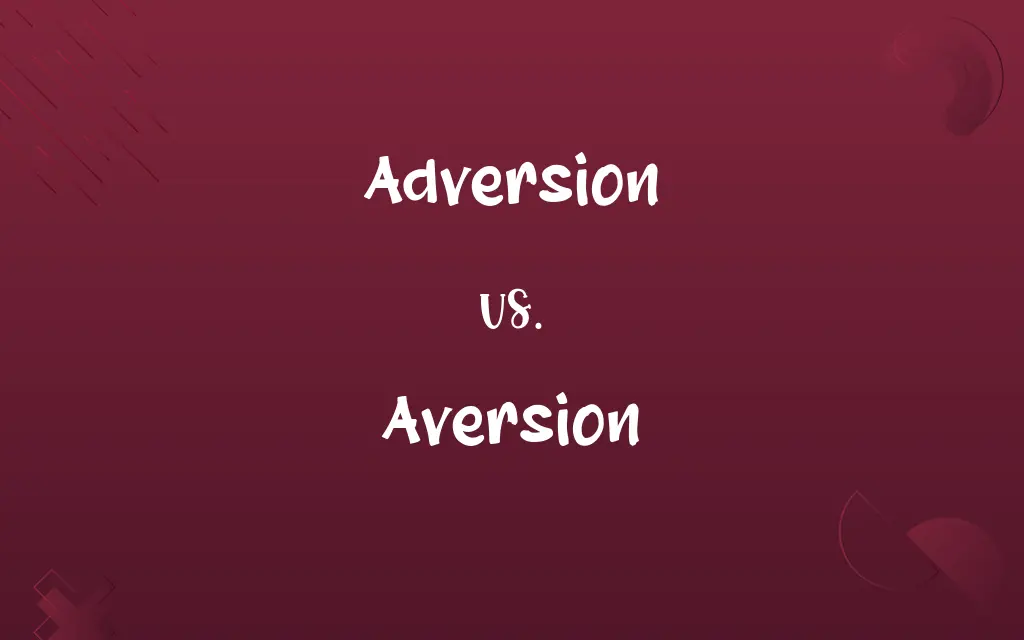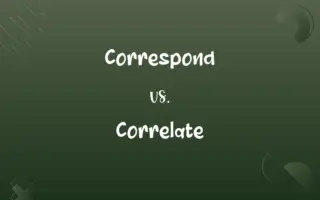Adversion vs. Aversion: Know the Difference

By Dua Fatima & Hifza Nasir || Updated on March 4, 2024
Adversion refers to the act of turning towards something, while aversion describes a strong dislike or disinclination. These terms diverge in their focus on approach versus avoidance.

Key Differences
Adversion signifies an orientation or movement towards an object, idea, or situation, highlighting an action of turning attention or effort in a specific direction. This term is rarely used in common language and often appears in more formal or specialized contexts, such as philosophical or technical discussions. On the other hand, aversion is a widely recognized term that denotes a strong feeling of repugnance, dislike, or unwillingness to engage with a particular entity. It is rooted in emotional response and personal preference, making it common in everyday language to express distaste or reluctance.
Dua Fatima
Mar 04, 2024
While adversion emphasizes an active engagement or alignment with something, aversion underlines a reactive distance or separation from it. The former is about a positive or neutral act of facing or dealing with something, which can be metaphorical or literal. Aversion, however, inherently carries a negative connotation, suggesting a psychological or physical withdrawal from something perceived as unpleasant or harmful.
Hifza Nasir
Mar 04, 2024
Adversion could be applied in contexts requiring a deliberate focus or adjustment towards specific goals, policies, or perspectives, suggesting a strategic or intentional move. Aversion is more about instinctual or emotional reactions, often used to describe personal preferences, fears, or ethical stances against something. This distinction underlines the proactive versus reactive nature of these terms.
Dua Fatima
Mar 04, 2024
In the realm of psychology or personal development, adversion might not be commonly discussed, but the concept can relate to cognitive and behavioral strategies aimed at facing fears or challenges. Whereas, aversion is a fundamental concept in psychological theories, including aversion therapy, where it's used to modify undesirable behaviors by associating them with unpleasant stimuli.
Dua Fatima
Mar 04, 2024
The practical applications of these terms also differ significantly. Adversion might be used in strategies, planning, or philosophical discourse, requiring a nuanced understanding of its implications. Aversion, by contrast, finds broader application in everyday decisions, social interactions, and personal health, reflecting common human tendencies to avoid discomfort or harm.
Shumaila Saeed
Mar 04, 2024
ADVERTISEMENT
Comparison Chart
Definition
The act of turning towards something.
A strong feeling of dislike or unwillingness to engage.
Dua Fatima
Mar 04, 2024
Usage Context
Formal, specialized contexts like philosophy or technical discussions.
Common in everyday language to express distaste or reluctance.
Hifza Nasir
Mar 04, 2024
Connotation
Neutral or positive, implies engagement or alignment.
Negative, suggests repugnance or withdrawal.
Dua Fatima
Mar 04, 2024
Psychological Aspect
Related to cognitive strategies facing challenges.
Fundamental in aversion therapy, modifying behaviors.
Dua Fatima
Mar 04, 2024
Practical Application
Used in strategic planning or philosophical discourse.
Applied in personal preferences and health decisions.
Hifza Nasir
Mar 04, 2024
ADVERTISEMENT
Adversion and Aversion Definitions
Adversion
Orientation towards a specific goal or idea.
His adversion to renewable energy solutions highlighted his environmental commitment.
Dua Fatima
Mar 04, 2024
Aversion
Emotional or psychological resistance to a particular idea or activity.
Her aversion to public speaking stemmed from anxiety.
Hifza Nasir
Mar 04, 2024
Adversion
The act of mentally or physically turning towards a subject.
The philosopher’s adversion towards a new theory sparked significant debate.
Hifza Nasir
Mar 04, 2024
Aversion
A strong dislike or disinclination towards something.
He has an aversion to seafood due to a bad experience.
Dua Fatima
Mar 04, 2024
Adversion
Strategic alignment with a particular perspective.
The company’s adversion towards customer-centric policies improved its market position.
Shumaila Saeed
Mar 04, 2024
ADVERTISEMENT
Aversion
Behavioral tendency to avoid certain stimuli.
Their aversion to risk affected their investment choices.
Hifza Nasir
Mar 04, 2024
Adversion
Cognitive focus on confronting challenges.
Her adversion to her fears led to significant personal growth.
Dua Fatima
Mar 04, 2024
Aversion
Ethical or moral opposition to a concept.
His aversion to injustice motivated his activism.
Shumaila Saeed
Mar 04, 2024
Adversion
Adjustment in direction or focus.
The adversion of resources towards research and development was a strategic move.
Shumaila Saeed
Mar 04, 2024
Aversion
Instinctual recoil from something perceived as unpleasant.
The aversion to pain is a basic human instinct.
Shumaila Saeed
Mar 04, 2024
Aversion
The cause or object of such a feeling
"I jumped up, and ran out of the room ... because a newspaper writer is my aversion" (Fanny Kemble).
Dua Fatima
Oct 19, 2023
Aversion
The avoidance of a thing, situation, or behavior because it has been associated with an unpleasant or painful stimulus.
Dua Fatima
Oct 19, 2023
Aversion
An object of dislike or repugnance.
Pushy salespeople are a major aversion of mine.
Dua Fatima
Oct 19, 2023
Aversion
The act of turning yourself (or your gaze) away;
Averting her gaze meant that she was angry
Dua Fatima
Oct 19, 2023
Repeatedly Asked Queries
What is adversion?
Adversion is the act of turning towards or aligning with something, often used in specialized or formal contexts.
Hifza Nasir
Mar 04, 2024
Can adversion have a positive connotation?
Yes, adversion can carry a neutral or positive connotation, implying engagement or a deliberate move towards something.
Shumaila Saeed
Mar 04, 2024
Is adversion a common term?
Adversion is not as commonly used as aversion and appears more in formal or specialized discussions.
Dua Fatima
Mar 04, 2024
Can aversion be beneficial?
Yes, aversion can be beneficial in avoiding harm or discomfort, guiding personal preferences and safety measures.
Dua Fatima
Mar 04, 2024
What are practical applications of adversion?
Practical applications of adversion include strategic planning, resource allocation, and philosophical discourse.
Dua Fatima
Mar 04, 2024
Does adversion imply a physical turn towards something?
Adversion can imply a physical or metaphorical turn towards something, depending on the context.
Hifza Nasir
Mar 04, 2024
How does societal context influence aversions?
Societal norms, cultural beliefs, and collective experiences can shape and influence individual aversions.
Shumaila Saeed
Mar 04, 2024
How do adversion and aversion relate to psychology?
Adversion relates to strategies for facing challenges, while aversion is a key concept in therapies aimed at modifying behaviors.
Hifza Nasir
Mar 04, 2024
Can someone overcome an aversion?
Yes, through exposure therapy and other psychological techniques, individuals can work to overcome specific aversions.
Dua Fatima
Mar 04, 2024
What motivates aversion in individuals?
Aversion can be motivated by past experiences, personal beliefs, psychological factors, or instinctual responses to perceived threats.
Shumaila Saeed
Mar 04, 2024
What does aversion mean?
Aversion refers to a strong feeling of dislike or reluctance to engage with something.
Dua Fatima
Mar 04, 2024
How are adversion and aversion used differently?
Adversion is used in contexts requiring strategic focus or alignment, whereas aversion is commonly used to express personal dislikes or discomforts.
Dua Fatima
Mar 04, 2024
Is aversion always negative?
Aversion typically has a negative connotation, as it involves a dislike or withdrawal from something perceived as unpleasant.
Dua Fatima
Mar 04, 2024
How does aversion affect everyday decisions?
Aversion influences everyday decisions by guiding preferences, social interactions, and health-related choices based on personal dislikes.
Shumaila Saeed
Mar 04, 2024
Are there any similarities between adversion and aversion?
While fundamentally different, both terms involve orientation or response to external stimuli, albeit in opposite directions (towards vs. away from).
Dua Fatima
Mar 04, 2024
Share this page
Link for your blog / website
HTML
Link to share via messenger
About Author
Written by
Dua FatimaCo-written by
Hifza Nasir





































































